Essay on Emotional Intelligence: Concepts, Factors, and Tools
VerifiedAdded on 2022/11/24
|10
|2155
|88
Essay
AI Summary
This essay provides a comprehensive discussion of emotional intelligence (EQ), differentiating it from intellectual intelligence (IQ). It explores factors that influence and impede EQ, including personal and social competencies such as self-awareness, self-management, social awareness, and relationship management. The essay also examines the impact of EQ on family dynamics, interpersonal relationships, and professional environments, highlighting the significance of empathy and social skills. Furthermore, it recommends tools and strategies for enhancing emotional intelligence, such as mindfulness practices, self-assessment, and EQ training programs. The essay concludes by emphasizing the importance of EQ in fostering healthy social interactions and overall well-being.
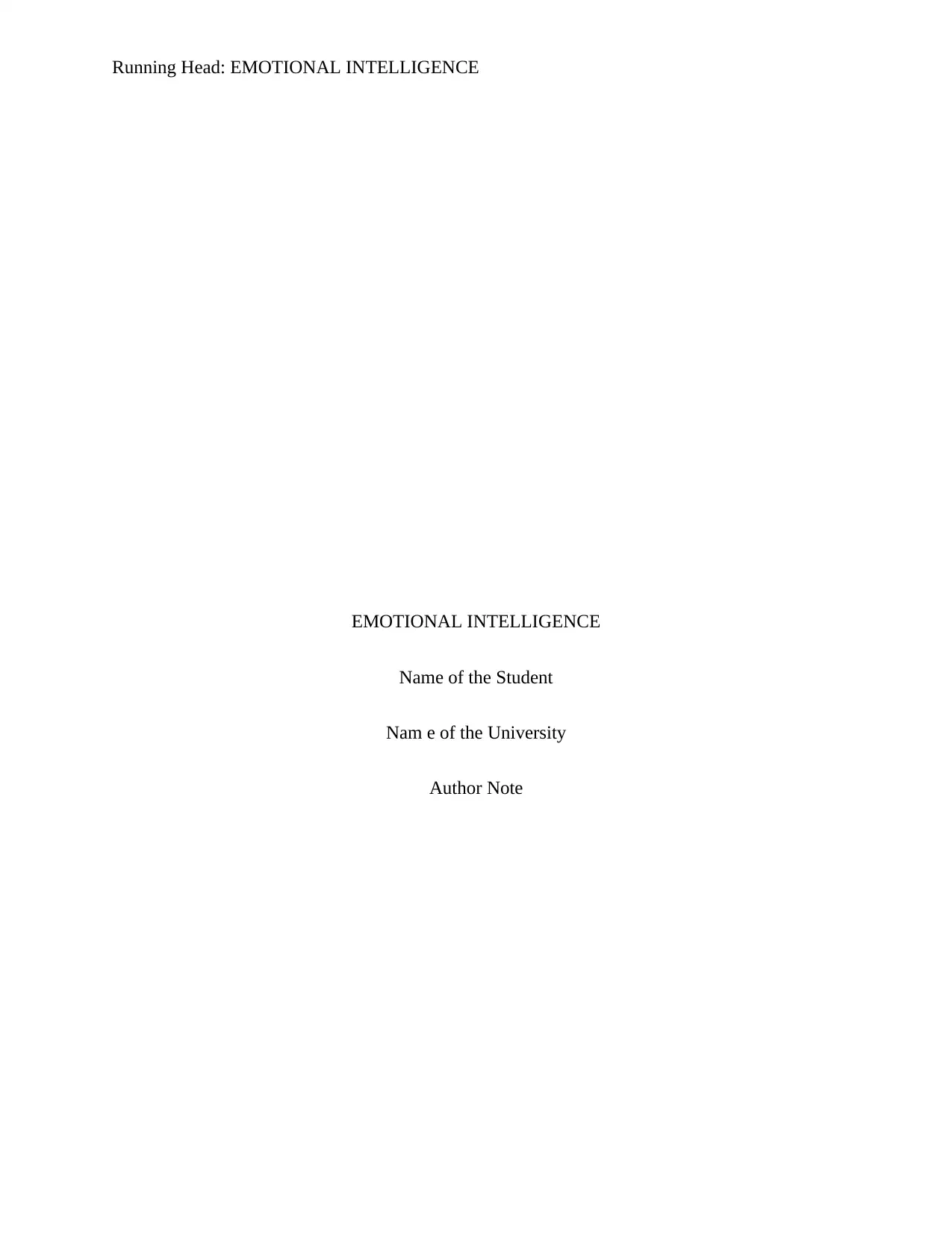
Running Head: EMOTIONAL INTELLIGENCE
EMOTIONAL INTELLIGENCE
Name of the Student
Nam e of the University
Author Note
EMOTIONAL INTELLIGENCE
Name of the Student
Nam e of the University
Author Note
Paraphrase This Document
Need a fresh take? Get an instant paraphrase of this document with our AI Paraphraser
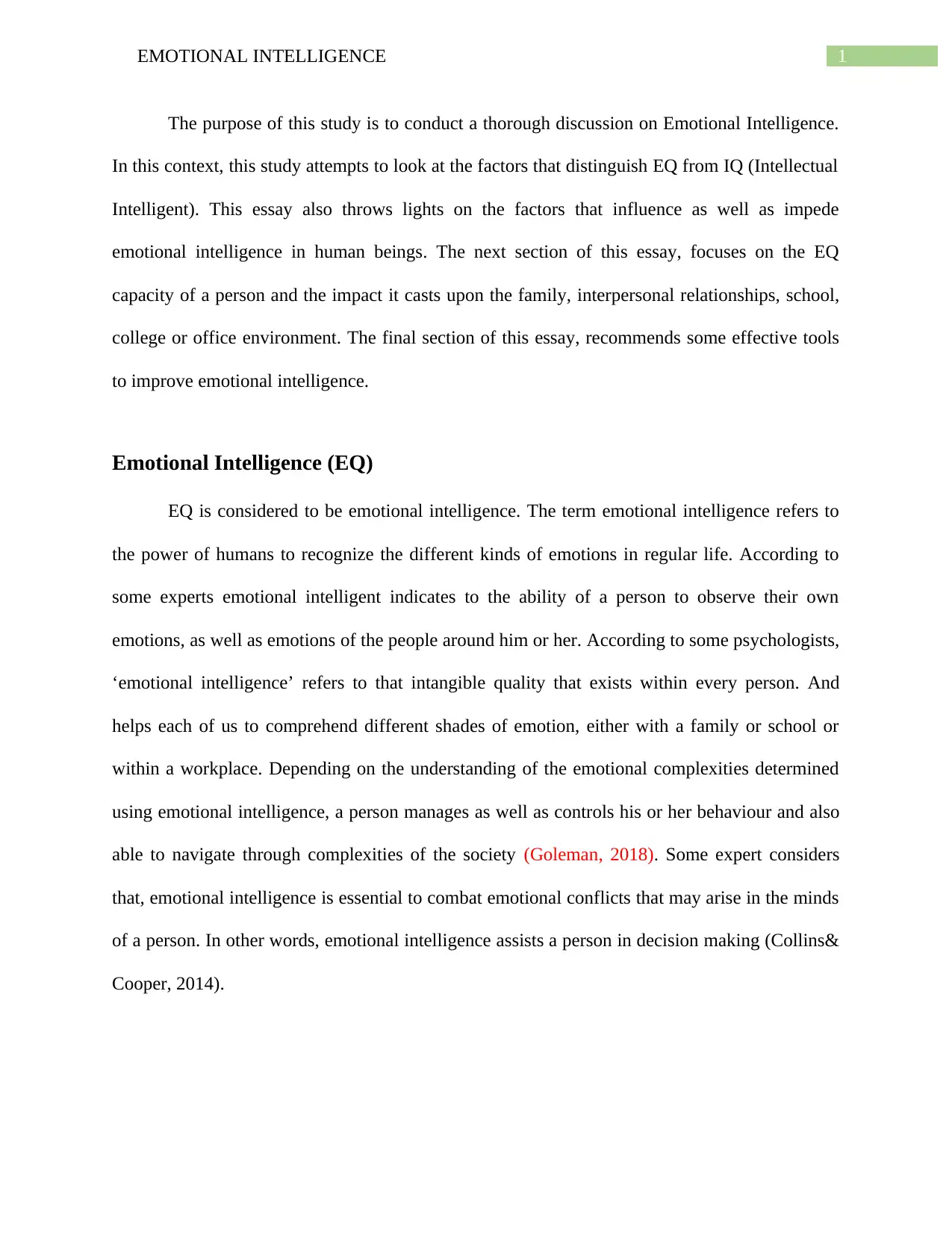
1EMOTIONAL INTELLIGENCE
The purpose of this study is to conduct a thorough discussion on Emotional Intelligence.
In this context, this study attempts to look at the factors that distinguish EQ from IQ (Intellectual
Intelligent). This essay also throws lights on the factors that influence as well as impede
emotional intelligence in human beings. The next section of this essay, focuses on the EQ
capacity of a person and the impact it casts upon the family, interpersonal relationships, school,
college or office environment. The final section of this essay, recommends some effective tools
to improve emotional intelligence.
Emotional Intelligence (EQ)
EQ is considered to be emotional intelligence. The term emotional intelligence refers to
the power of humans to recognize the different kinds of emotions in regular life. According to
some experts emotional intelligent indicates to the ability of a person to observe their own
emotions, as well as emotions of the people around him or her. According to some psychologists,
‘emotional intelligence’ refers to that intangible quality that exists within every person. And
helps each of us to comprehend different shades of emotion, either with a family or school or
within a workplace. Depending on the understanding of the emotional complexities determined
using emotional intelligence, a person manages as well as controls his or her behaviour and also
able to navigate through complexities of the society (Goleman, 2018). Some expert considers
that, emotional intelligence is essential to combat emotional conflicts that may arise in the minds
of a person. In other words, emotional intelligence assists a person in decision making (Collins&
Cooper, 2014).
The purpose of this study is to conduct a thorough discussion on Emotional Intelligence.
In this context, this study attempts to look at the factors that distinguish EQ from IQ (Intellectual
Intelligent). This essay also throws lights on the factors that influence as well as impede
emotional intelligence in human beings. The next section of this essay, focuses on the EQ
capacity of a person and the impact it casts upon the family, interpersonal relationships, school,
college or office environment. The final section of this essay, recommends some effective tools
to improve emotional intelligence.
Emotional Intelligence (EQ)
EQ is considered to be emotional intelligence. The term emotional intelligence refers to
the power of humans to recognize the different kinds of emotions in regular life. According to
some experts emotional intelligent indicates to the ability of a person to observe their own
emotions, as well as emotions of the people around him or her. According to some psychologists,
‘emotional intelligence’ refers to that intangible quality that exists within every person. And
helps each of us to comprehend different shades of emotion, either with a family or school or
within a workplace. Depending on the understanding of the emotional complexities determined
using emotional intelligence, a person manages as well as controls his or her behaviour and also
able to navigate through complexities of the society (Goleman, 2018). Some expert considers
that, emotional intelligence is essential to combat emotional conflicts that may arise in the minds
of a person. In other words, emotional intelligence assists a person in decision making (Collins&
Cooper, 2014).
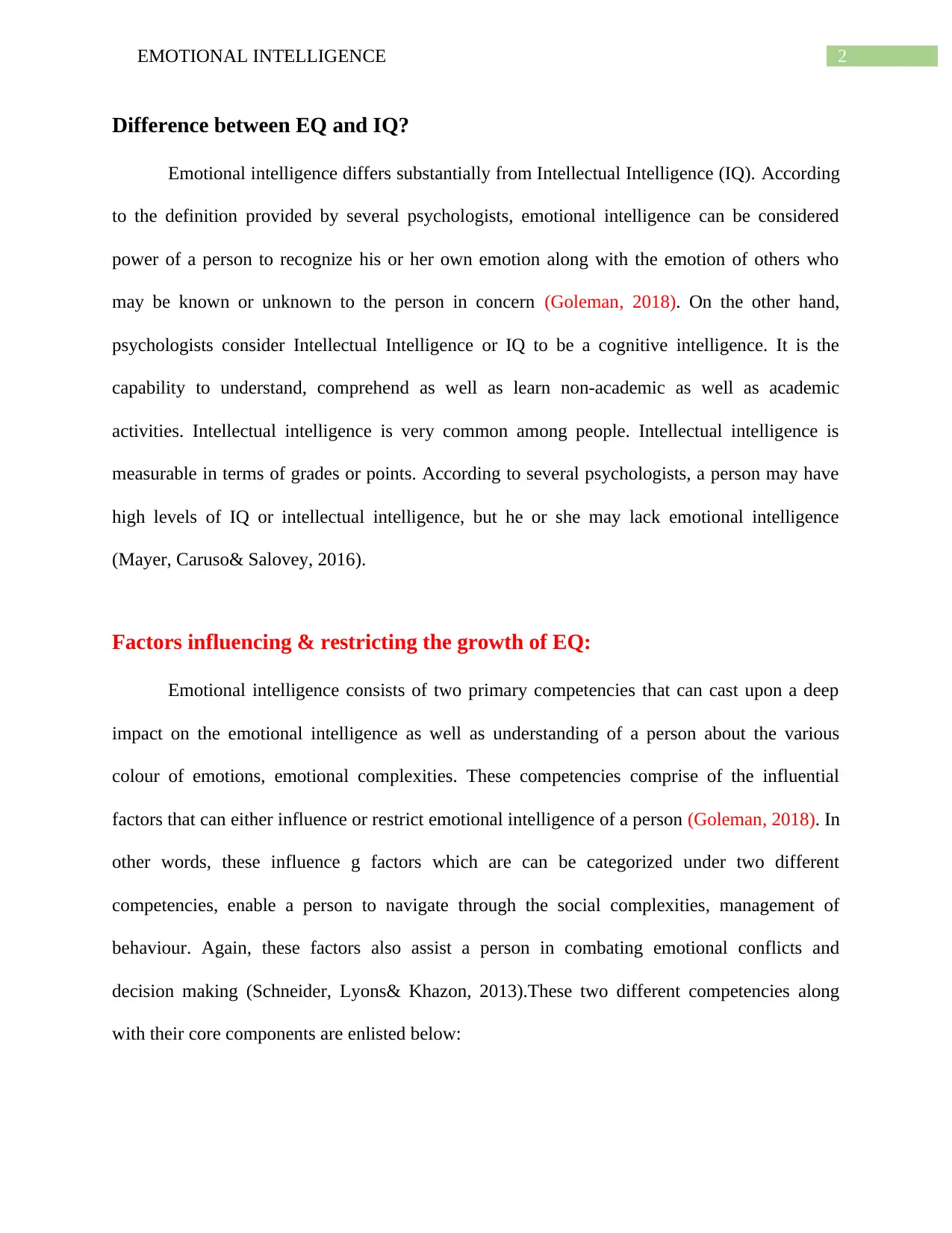
2EMOTIONAL INTELLIGENCE
Difference between EQ and IQ?
Emotional intelligence differs substantially from Intellectual Intelligence (IQ). According
to the definition provided by several psychologists, emotional intelligence can be considered
power of a person to recognize his or her own emotion along with the emotion of others who
may be known or unknown to the person in concern (Goleman, 2018). On the other hand,
psychologists consider Intellectual Intelligence or IQ to be a cognitive intelligence. It is the
capability to understand, comprehend as well as learn non-academic as well as academic
activities. Intellectual intelligence is very common among people. Intellectual intelligence is
measurable in terms of grades or points. According to several psychologists, a person may have
high levels of IQ or intellectual intelligence, but he or she may lack emotional intelligence
(Mayer, Caruso& Salovey, 2016).
Factors influencing & restricting the growth of EQ:
Emotional intelligence consists of two primary competencies that can cast upon a deep
impact on the emotional intelligence as well as understanding of a person about the various
colour of emotions, emotional complexities. These competencies comprise of the influential
factors that can either influence or restrict emotional intelligence of a person (Goleman, 2018). In
other words, these influence g factors which are can be categorized under two different
competencies, enable a person to navigate through the social complexities, management of
behaviour. Again, these factors also assist a person in combating emotional conflicts and
decision making (Schneider, Lyons& Khazon, 2013).These two different competencies along
with their core components are enlisted below:
Difference between EQ and IQ?
Emotional intelligence differs substantially from Intellectual Intelligence (IQ). According
to the definition provided by several psychologists, emotional intelligence can be considered
power of a person to recognize his or her own emotion along with the emotion of others who
may be known or unknown to the person in concern (Goleman, 2018). On the other hand,
psychologists consider Intellectual Intelligence or IQ to be a cognitive intelligence. It is the
capability to understand, comprehend as well as learn non-academic as well as academic
activities. Intellectual intelligence is very common among people. Intellectual intelligence is
measurable in terms of grades or points. According to several psychologists, a person may have
high levels of IQ or intellectual intelligence, but he or she may lack emotional intelligence
(Mayer, Caruso& Salovey, 2016).
Factors influencing & restricting the growth of EQ:
Emotional intelligence consists of two primary competencies that can cast upon a deep
impact on the emotional intelligence as well as understanding of a person about the various
colour of emotions, emotional complexities. These competencies comprise of the influential
factors that can either influence or restrict emotional intelligence of a person (Goleman, 2018). In
other words, these influence g factors which are can be categorized under two different
competencies, enable a person to navigate through the social complexities, management of
behaviour. Again, these factors also assist a person in combating emotional conflicts and
decision making (Schneider, Lyons& Khazon, 2013).These two different competencies along
with their core components are enlisted below:
⊘ This is a preview!⊘
Do you want full access?
Subscribe today to unlock all pages.

Trusted by 1+ million students worldwide
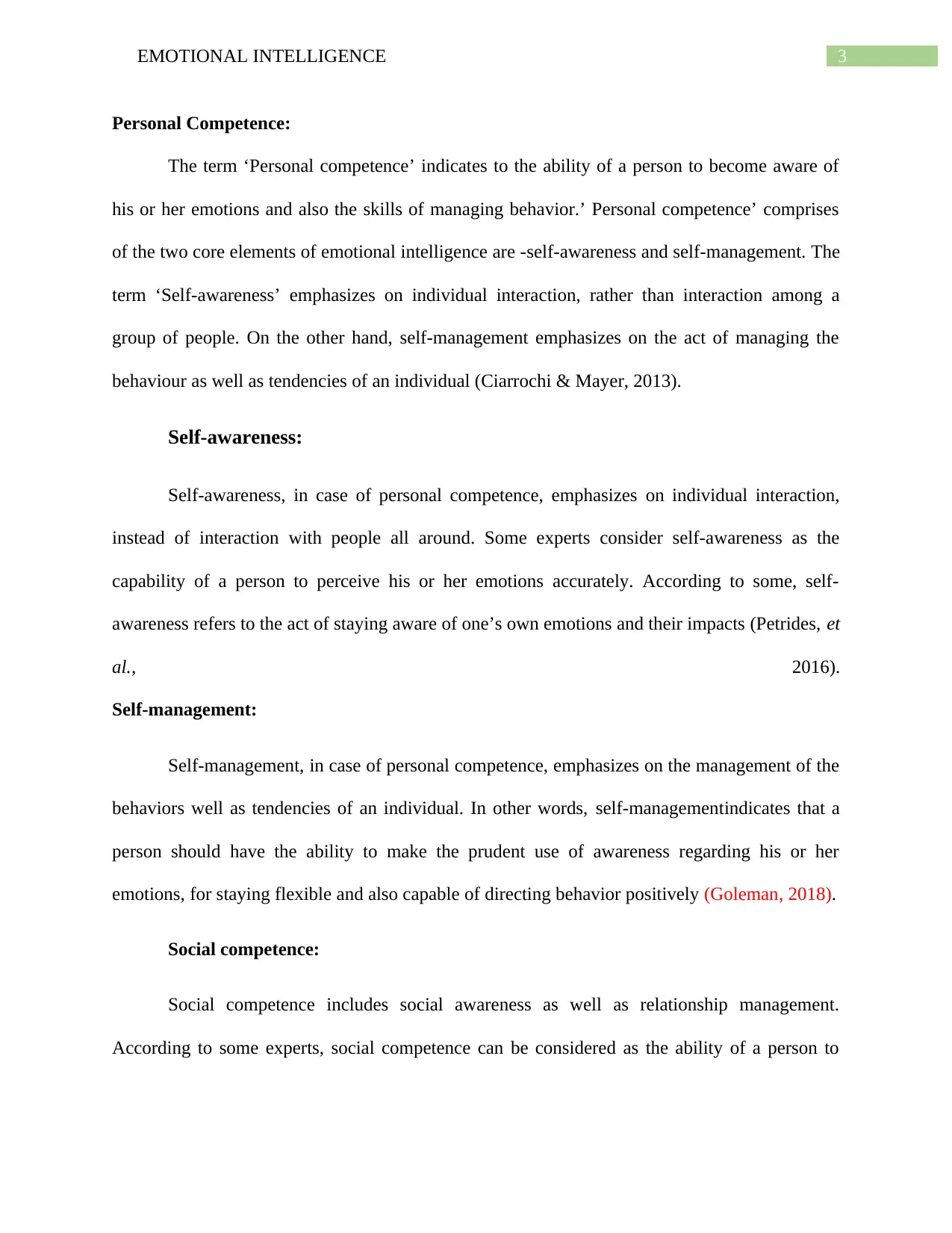
3EMOTIONAL INTELLIGENCE
Personal Competence:
The term ‘Personal competence’ indicates to the ability of a person to become aware of
his or her emotions and also the skills of managing behavior.’ Personal competence’ comprises
of the two core elements of emotional intelligence are -self-awareness and self-management. The
term ‘Self-awareness’ emphasizes on individual interaction, rather than interaction among a
group of people. On the other hand, self-management emphasizes on the act of managing the
behaviour as well as tendencies of an individual (Ciarrochi & Mayer, 2013).
Self-awareness:
Self-awareness, in case of personal competence, emphasizes on individual interaction,
instead of interaction with people all around. Some experts consider self-awareness as the
capability of a person to perceive his or her emotions accurately. According to some, self-
awareness refers to the act of staying aware of one’s own emotions and their impacts (Petrides, et
al., 2016).
Self-management:
Self-management, in case of personal competence, emphasizes on the management of the
behaviors well as tendencies of an individual. In other words, self-managementindicates that a
person should have the ability to make the prudent use of awareness regarding his or her
emotions, for staying flexible and also capable of directing behavior positively (Goleman, 2018).
Social competence:
Social competence includes social awareness as well as relationship management.
According to some experts, social competence can be considered as the ability of a person to
Personal Competence:
The term ‘Personal competence’ indicates to the ability of a person to become aware of
his or her emotions and also the skills of managing behavior.’ Personal competence’ comprises
of the two core elements of emotional intelligence are -self-awareness and self-management. The
term ‘Self-awareness’ emphasizes on individual interaction, rather than interaction among a
group of people. On the other hand, self-management emphasizes on the act of managing the
behaviour as well as tendencies of an individual (Ciarrochi & Mayer, 2013).
Self-awareness:
Self-awareness, in case of personal competence, emphasizes on individual interaction,
instead of interaction with people all around. Some experts consider self-awareness as the
capability of a person to perceive his or her emotions accurately. According to some, self-
awareness refers to the act of staying aware of one’s own emotions and their impacts (Petrides, et
al., 2016).
Self-management:
Self-management, in case of personal competence, emphasizes on the management of the
behaviors well as tendencies of an individual. In other words, self-managementindicates that a
person should have the ability to make the prudent use of awareness regarding his or her
emotions, for staying flexible and also capable of directing behavior positively (Goleman, 2018).
Social competence:
Social competence includes social awareness as well as relationship management.
According to some experts, social competence can be considered as the ability of a person to
Paraphrase This Document
Need a fresh take? Get an instant paraphrase of this document with our AI Paraphraser
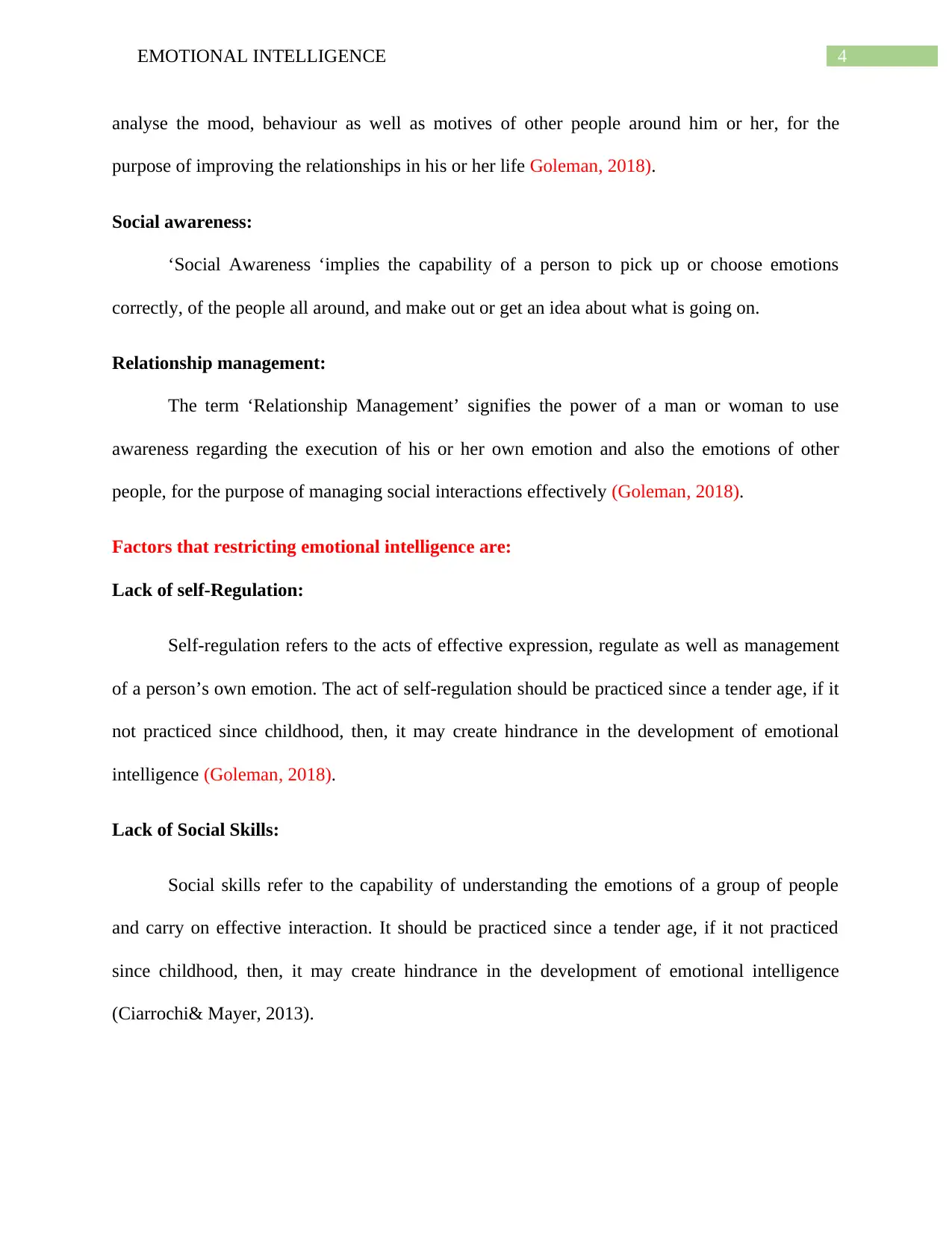
4EMOTIONAL INTELLIGENCE
analyse the mood, behaviour as well as motives of other people around him or her, for the
purpose of improving the relationships in his or her life Goleman, 2018).
Social awareness:
‘Social Awareness ‘implies the capability of a person to pick up or choose emotions
correctly, of the people all around, and make out or get an idea about what is going on.
Relationship management:
The term ‘Relationship Management’ signifies the power of a man or woman to use
awareness regarding the execution of his or her own emotion and also the emotions of other
people, for the purpose of managing social interactions effectively (Goleman, 2018).
Factors that restricting emotional intelligence are:
Lack of self-Regulation:
Self-regulation refers to the acts of effective expression, regulate as well as management
of a person’s own emotion. The act of self-regulation should be practiced since a tender age, if it
not practiced since childhood, then, it may create hindrance in the development of emotional
intelligence (Goleman, 2018).
Lack of Social Skills:
Social skills refer to the capability of understanding the emotions of a group of people
and carry on effective interaction. It should be practiced since a tender age, if it not practiced
since childhood, then, it may create hindrance in the development of emotional intelligence
(Ciarrochi& Mayer, 2013).
analyse the mood, behaviour as well as motives of other people around him or her, for the
purpose of improving the relationships in his or her life Goleman, 2018).
Social awareness:
‘Social Awareness ‘implies the capability of a person to pick up or choose emotions
correctly, of the people all around, and make out or get an idea about what is going on.
Relationship management:
The term ‘Relationship Management’ signifies the power of a man or woman to use
awareness regarding the execution of his or her own emotion and also the emotions of other
people, for the purpose of managing social interactions effectively (Goleman, 2018).
Factors that restricting emotional intelligence are:
Lack of self-Regulation:
Self-regulation refers to the acts of effective expression, regulate as well as management
of a person’s own emotion. The act of self-regulation should be practiced since a tender age, if it
not practiced since childhood, then, it may create hindrance in the development of emotional
intelligence (Goleman, 2018).
Lack of Social Skills:
Social skills refer to the capability of understanding the emotions of a group of people
and carry on effective interaction. It should be practiced since a tender age, if it not practiced
since childhood, then, it may create hindrance in the development of emotional intelligence
(Ciarrochi& Mayer, 2013).
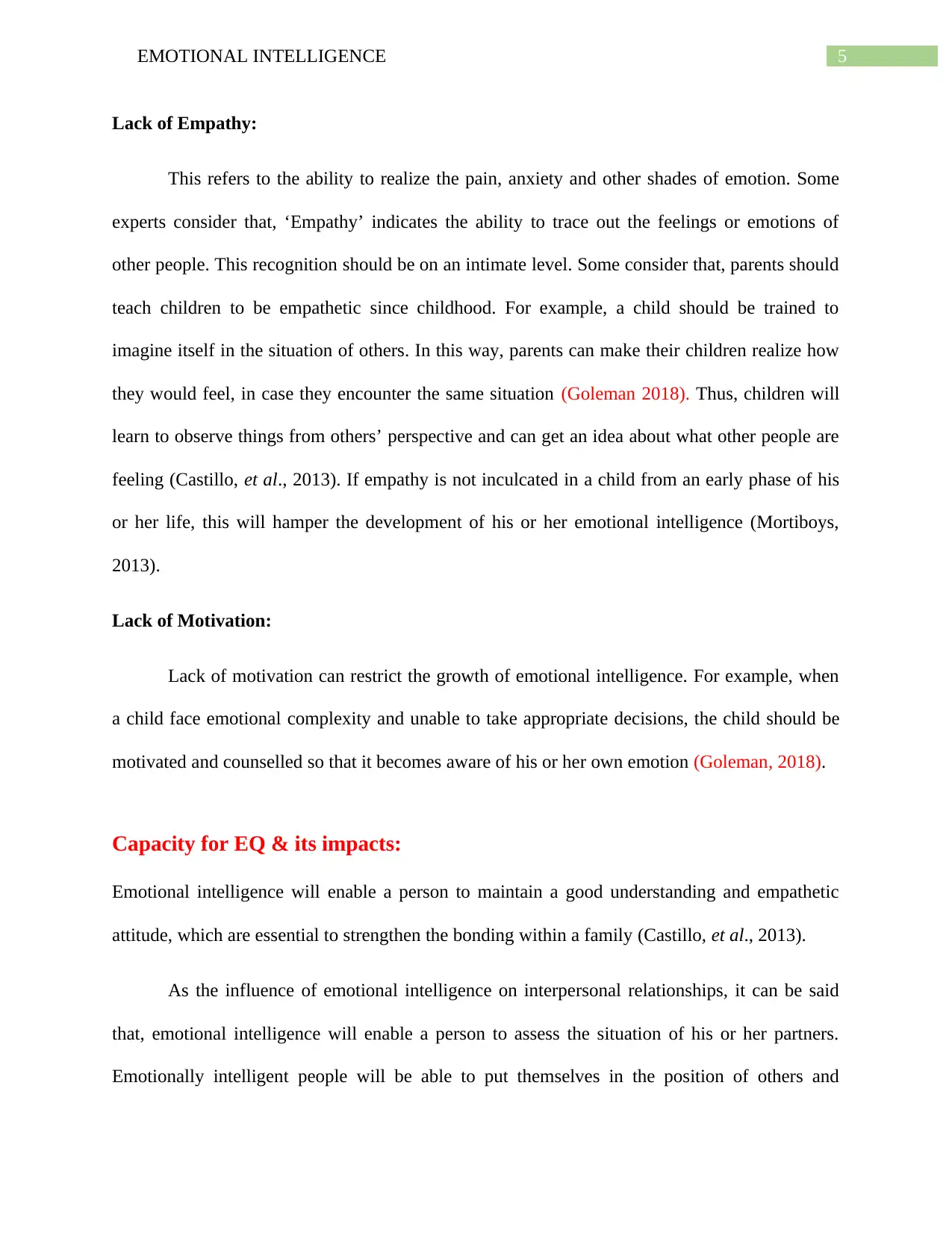
5EMOTIONAL INTELLIGENCE
Lack of Empathy:
This refers to the ability to realize the pain, anxiety and other shades of emotion. Some
experts consider that, ‘Empathy’ indicates the ability to trace out the feelings or emotions of
other people. This recognition should be on an intimate level. Some consider that, parents should
teach children to be empathetic since childhood. For example, a child should be trained to
imagine itself in the situation of others. In this way, parents can make their children realize how
they would feel, in case they encounter the same situation (Goleman 2018). Thus, children will
learn to observe things from others’ perspective and can get an idea about what other people are
feeling (Castillo, et al., 2013). If empathy is not inculcated in a child from an early phase of his
or her life, this will hamper the development of his or her emotional intelligence (Mortiboys,
2013).
Lack of Motivation:
Lack of motivation can restrict the growth of emotional intelligence. For example, when
a child face emotional complexity and unable to take appropriate decisions, the child should be
motivated and counselled so that it becomes aware of his or her own emotion (Goleman, 2018).
Capacity for EQ & its impacts:
Emotional intelligence will enable a person to maintain a good understanding and empathetic
attitude, which are essential to strengthen the bonding within a family (Castillo, et al., 2013).
As the influence of emotional intelligence on interpersonal relationships, it can be said
that, emotional intelligence will enable a person to assess the situation of his or her partners.
Emotionally intelligent people will be able to put themselves in the position of others and
Lack of Empathy:
This refers to the ability to realize the pain, anxiety and other shades of emotion. Some
experts consider that, ‘Empathy’ indicates the ability to trace out the feelings or emotions of
other people. This recognition should be on an intimate level. Some consider that, parents should
teach children to be empathetic since childhood. For example, a child should be trained to
imagine itself in the situation of others. In this way, parents can make their children realize how
they would feel, in case they encounter the same situation (Goleman 2018). Thus, children will
learn to observe things from others’ perspective and can get an idea about what other people are
feeling (Castillo, et al., 2013). If empathy is not inculcated in a child from an early phase of his
or her life, this will hamper the development of his or her emotional intelligence (Mortiboys,
2013).
Lack of Motivation:
Lack of motivation can restrict the growth of emotional intelligence. For example, when
a child face emotional complexity and unable to take appropriate decisions, the child should be
motivated and counselled so that it becomes aware of his or her own emotion (Goleman, 2018).
Capacity for EQ & its impacts:
Emotional intelligence will enable a person to maintain a good understanding and empathetic
attitude, which are essential to strengthen the bonding within a family (Castillo, et al., 2013).
As the influence of emotional intelligence on interpersonal relationships, it can be said
that, emotional intelligence will enable a person to assess the situation of his or her partners.
Emotionally intelligent people will be able to put themselves in the position of others and
⊘ This is a preview!⊘
Do you want full access?
Subscribe today to unlock all pages.

Trusted by 1+ million students worldwide
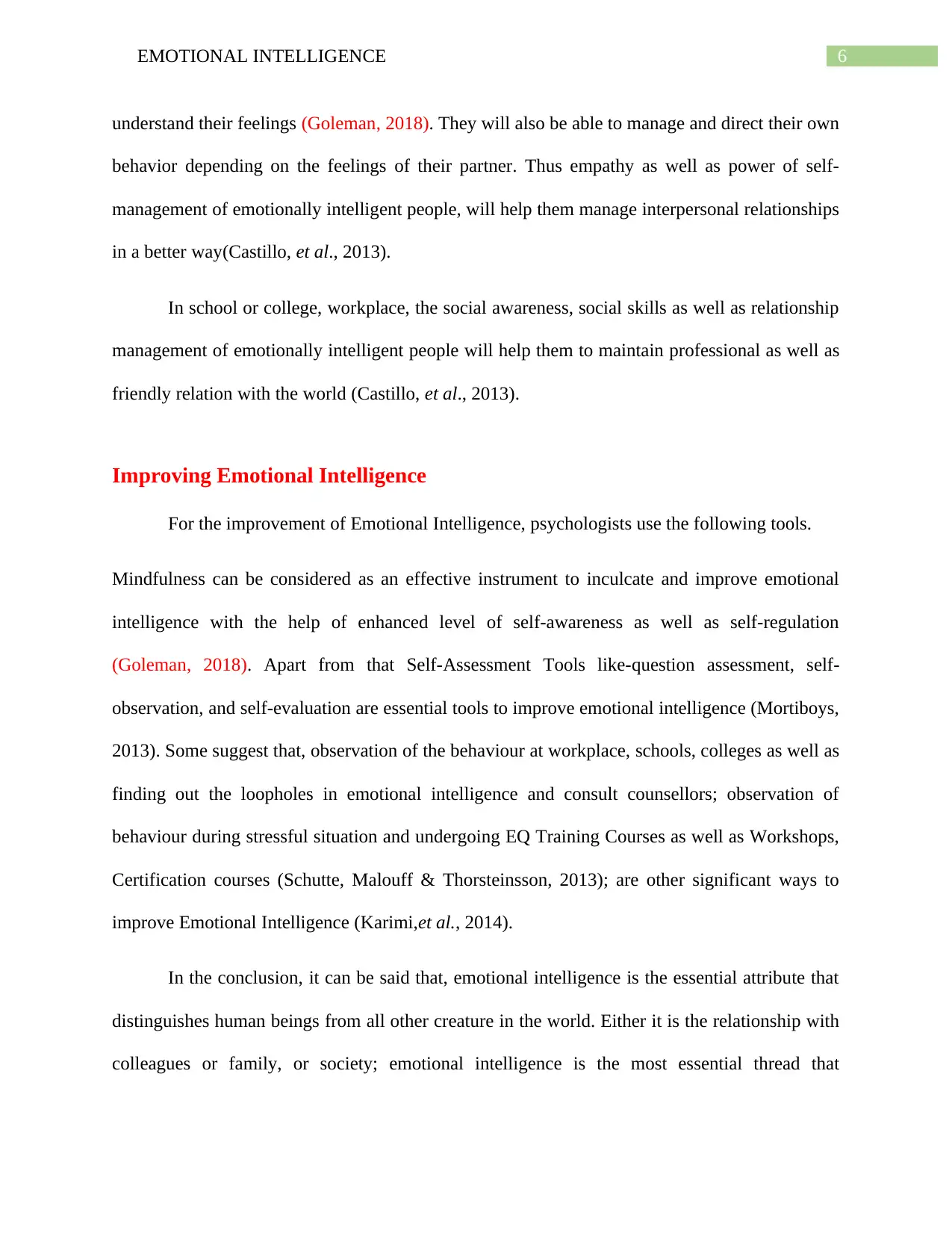
6EMOTIONAL INTELLIGENCE
understand their feelings (Goleman, 2018). They will also be able to manage and direct their own
behavior depending on the feelings of their partner. Thus empathy as well as power of self-
management of emotionally intelligent people, will help them manage interpersonal relationships
in a better way(Castillo, et al., 2013).
In school or college, workplace, the social awareness, social skills as well as relationship
management of emotionally intelligent people will help them to maintain professional as well as
friendly relation with the world (Castillo, et al., 2013).
Improving Emotional Intelligence
For the improvement of Emotional Intelligence, psychologists use the following tools.
Mindfulness can be considered as an effective instrument to inculcate and improve emotional
intelligence with the help of enhanced level of self-awareness as well as self-regulation
(Goleman, 2018). Apart from that Self-Assessment Tools like-question assessment, self-
observation, and self-evaluation are essential tools to improve emotional intelligence (Mortiboys,
2013). Some suggest that, observation of the behaviour at workplace, schools, colleges as well as
finding out the loopholes in emotional intelligence and consult counsellors; observation of
behaviour during stressful situation and undergoing EQ Training Courses as well as Workshops,
Certification courses (Schutte, Malouff & Thorsteinsson, 2013); are other significant ways to
improve Emotional Intelligence (Karimi,et al., 2014).
In the conclusion, it can be said that, emotional intelligence is the essential attribute that
distinguishes human beings from all other creature in the world. Either it is the relationship with
colleagues or family, or society; emotional intelligence is the most essential thread that
understand their feelings (Goleman, 2018). They will also be able to manage and direct their own
behavior depending on the feelings of their partner. Thus empathy as well as power of self-
management of emotionally intelligent people, will help them manage interpersonal relationships
in a better way(Castillo, et al., 2013).
In school or college, workplace, the social awareness, social skills as well as relationship
management of emotionally intelligent people will help them to maintain professional as well as
friendly relation with the world (Castillo, et al., 2013).
Improving Emotional Intelligence
For the improvement of Emotional Intelligence, psychologists use the following tools.
Mindfulness can be considered as an effective instrument to inculcate and improve emotional
intelligence with the help of enhanced level of self-awareness as well as self-regulation
(Goleman, 2018). Apart from that Self-Assessment Tools like-question assessment, self-
observation, and self-evaluation are essential tools to improve emotional intelligence (Mortiboys,
2013). Some suggest that, observation of the behaviour at workplace, schools, colleges as well as
finding out the loopholes in emotional intelligence and consult counsellors; observation of
behaviour during stressful situation and undergoing EQ Training Courses as well as Workshops,
Certification courses (Schutte, Malouff & Thorsteinsson, 2013); are other significant ways to
improve Emotional Intelligence (Karimi,et al., 2014).
In the conclusion, it can be said that, emotional intelligence is the essential attribute that
distinguishes human beings from all other creature in the world. Either it is the relationship with
colleagues or family, or society; emotional intelligence is the most essential thread that
Paraphrase This Document
Need a fresh take? Get an instant paraphrase of this document with our AI Paraphraser

7EMOTIONAL INTELLIGENCE
strengthens the bonding. Hence, emotional intelligence should be nourished in order to live a
healthy social life.
strengthens the bonding. Hence, emotional intelligence should be nourished in order to live a
healthy social life.
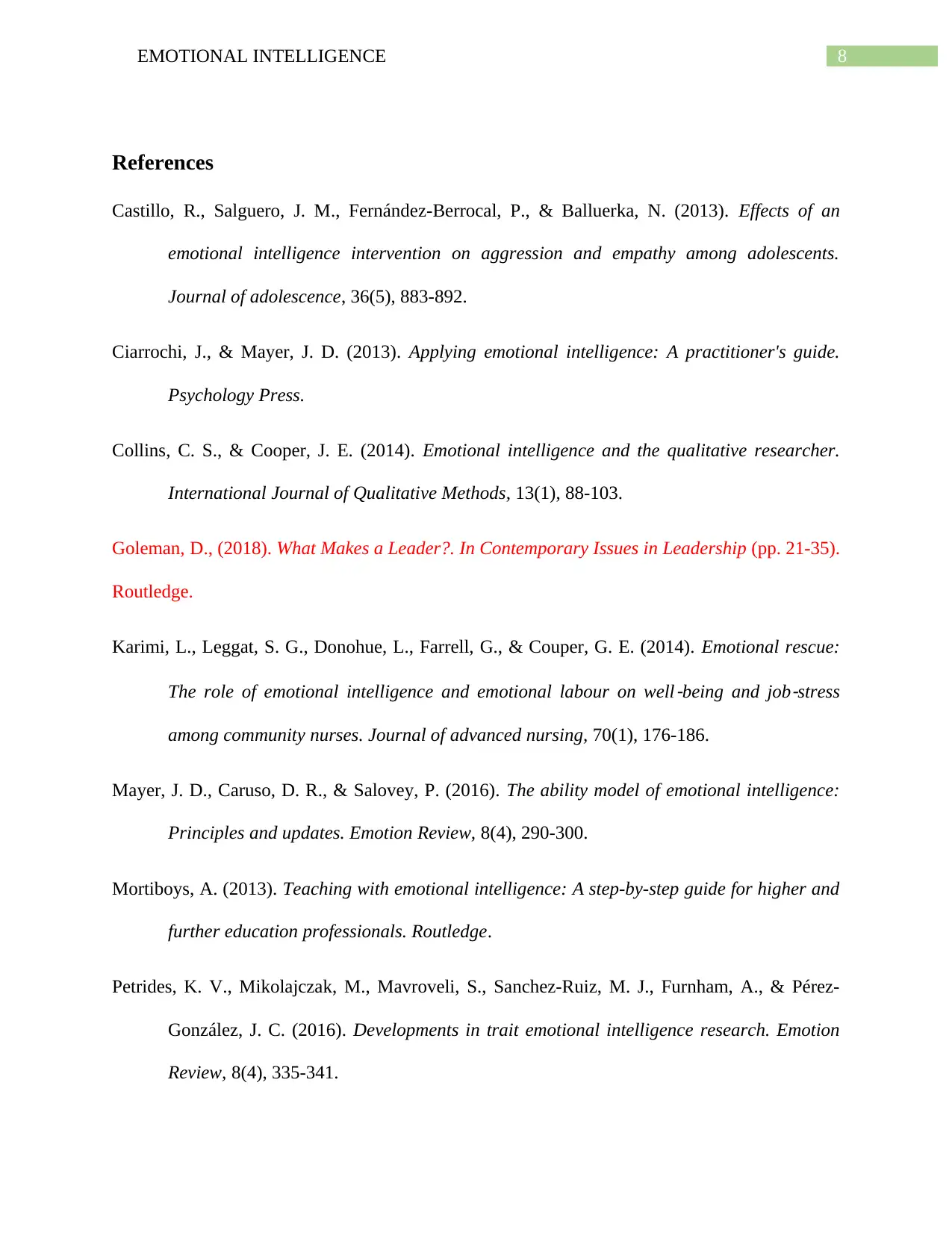
8EMOTIONAL INTELLIGENCE
References
Castillo, R., Salguero, J. M., Fernández-Berrocal, P., & Balluerka, N. (2013). Effects of an
emotional intelligence intervention on aggression and empathy among adolescents.
Journal of adolescence, 36(5), 883-892.
Ciarrochi, J., & Mayer, J. D. (2013). Applying emotional intelligence: A practitioner's guide.
Psychology Press.
Collins, C. S., & Cooper, J. E. (2014). Emotional intelligence and the qualitative researcher.
International Journal of Qualitative Methods, 13(1), 88-103.
Goleman, D., (2018). What Makes a Leader?. In Contemporary Issues in Leadership (pp. 21-35).
Routledge.
Karimi, L., Leggat, S. G., Donohue, L., Farrell, G., & Couper, G. E. (2014). Emotional rescue:
The role of emotional intelligence and emotional labour on well
‐being and job
‐stress
among community nurses. Journal of advanced nursing, 70(1), 176-186.
Mayer, J. D., Caruso, D. R., & Salovey, P. (2016). The ability model of emotional intelligence:
Principles and updates. Emotion Review, 8(4), 290-300.
Mortiboys, A. (2013). Teaching with emotional intelligence: A step-by-step guide for higher and
further education professionals. Routledge.
Petrides, K. V., Mikolajczak, M., Mavroveli, S., Sanchez-Ruiz, M. J., Furnham, A., & Pérez-
González, J. C. (2016). Developments in trait emotional intelligence research. Emotion
Review, 8(4), 335-341.
References
Castillo, R., Salguero, J. M., Fernández-Berrocal, P., & Balluerka, N. (2013). Effects of an
emotional intelligence intervention on aggression and empathy among adolescents.
Journal of adolescence, 36(5), 883-892.
Ciarrochi, J., & Mayer, J. D. (2013). Applying emotional intelligence: A practitioner's guide.
Psychology Press.
Collins, C. S., & Cooper, J. E. (2014). Emotional intelligence and the qualitative researcher.
International Journal of Qualitative Methods, 13(1), 88-103.
Goleman, D., (2018). What Makes a Leader?. In Contemporary Issues in Leadership (pp. 21-35).
Routledge.
Karimi, L., Leggat, S. G., Donohue, L., Farrell, G., & Couper, G. E. (2014). Emotional rescue:
The role of emotional intelligence and emotional labour on well
‐being and job
‐stress
among community nurses. Journal of advanced nursing, 70(1), 176-186.
Mayer, J. D., Caruso, D. R., & Salovey, P. (2016). The ability model of emotional intelligence:
Principles and updates. Emotion Review, 8(4), 290-300.
Mortiboys, A. (2013). Teaching with emotional intelligence: A step-by-step guide for higher and
further education professionals. Routledge.
Petrides, K. V., Mikolajczak, M., Mavroveli, S., Sanchez-Ruiz, M. J., Furnham, A., & Pérez-
González, J. C. (2016). Developments in trait emotional intelligence research. Emotion
Review, 8(4), 335-341.
⊘ This is a preview!⊘
Do you want full access?
Subscribe today to unlock all pages.

Trusted by 1+ million students worldwide
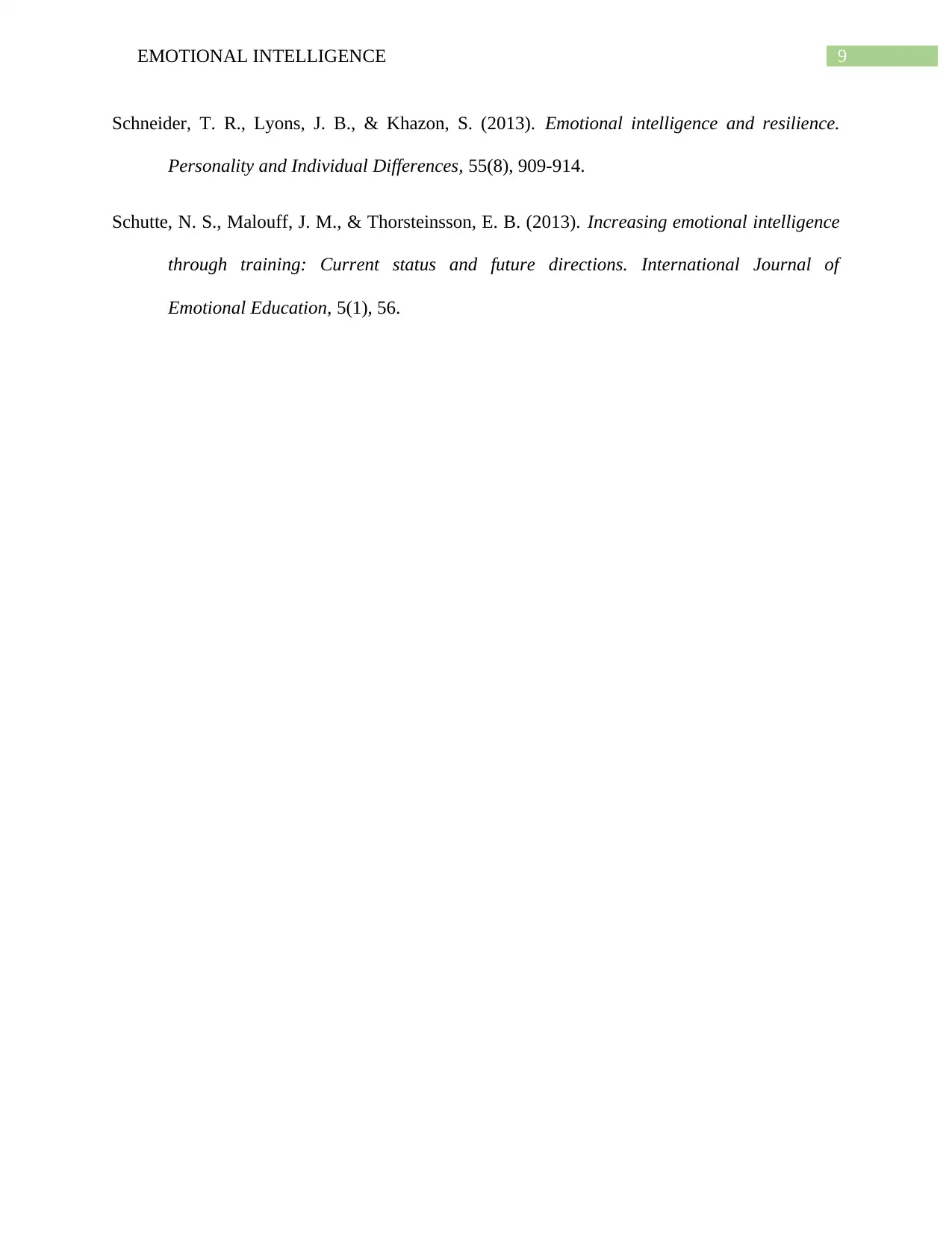
9EMOTIONAL INTELLIGENCE
Schneider, T. R., Lyons, J. B., & Khazon, S. (2013). Emotional intelligence and resilience.
Personality and Individual Differences, 55(8), 909-914.
Schutte, N. S., Malouff, J. M., & Thorsteinsson, E. B. (2013). Increasing emotional intelligence
through training: Current status and future directions. International Journal of
Emotional Education, 5(1), 56.
Schneider, T. R., Lyons, J. B., & Khazon, S. (2013). Emotional intelligence and resilience.
Personality and Individual Differences, 55(8), 909-914.
Schutte, N. S., Malouff, J. M., & Thorsteinsson, E. B. (2013). Increasing emotional intelligence
through training: Current status and future directions. International Journal of
Emotional Education, 5(1), 56.
1 out of 10
Related Documents
Your All-in-One AI-Powered Toolkit for Academic Success.
+13062052269
info@desklib.com
Available 24*7 on WhatsApp / Email
![[object Object]](/_next/static/media/star-bottom.7253800d.svg)
Unlock your academic potential
Copyright © 2020–2026 A2Z Services. All Rights Reserved. Developed and managed by ZUCOL.




